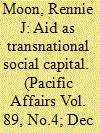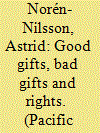| Srl | Item |
| 1 |
ID:
149175


|
|
|
|
|
| Summary/Abstract |
In this paper, we explore a new framework for higher education official development assistance (ODA) with a focus on the transnational bridging benefits of social capital. We first explain why and how a transnational social capital approach can improve the current focus on human resources and local bridges in higher education development. We then illustrate its merits by examining, 1) the transnational bridging potential of social capital formed by foreign students currently studying in Korea; and 2) the actual transnational social capital contributions of foreign professionals who returned home after completing a Korean higher education ODA program. In doing so, we direct particular attention to the value of transnational social capital in promoting development cooperation and public diplomacy. We conclude by discussing how our approach has conceptual importance and practical implications for development cooperation in higher education.
|
|
|
|
|
|
|
|
|
|
|
|
|
|
|
|
| 2 |
ID:
149176


|
|
|
|
|
| Summary/Abstract |
Why does Canada lack the closeness of economic ties with China enjoyed by other developed Commonwealth countries, such as New Zealand? While these countries take similar positions toward China with regard to human rights and security-related matters, they differ markedly in terms of trade relations—New Zealand inked a free trade deal with Beijing in 2008, while such an agreement between Canada and China has remained out of reach. This article probes the source of this divergence. The answer, it is argued, lies in the sociotropic effects of political opposition groups on both the left and the right in Canada, and the absence of parallel conditions in New Zealand.
|
|
|
|
|
|
|
|
|
|
|
|
|
|
|
|
| 3 |
ID:
149173


|
|
|
|
|
| Summary/Abstract |
In the Cambodian national elections in 2013, the opposition Cambodia National Rescue Party (CNRP) experienced a strong surge in support, finishing a close second to the long-incumbent Cambodian People’s Party (CPP). Whilst the CNRP campaigned on an anti-money politics, rights-based agenda, the CPP has relied on gift-giving practices to maintain links with voters. This article explores changing popular conceptions of issue_images_89_4_nilsson_cambodia-election-perceptions-ea-image02-jpgprovision to assess to what extent a democratic, rights-based conscience in Cambodia has emerged under the current neo-patrimonial regime. Building on qualitative interviews with 192 voters in post-election Cambodia, it finds that gift-giving practices play a different role than current academic theorizations of popular politics, and Cambodian popular politics in particular, would lead us to expect. Ordinary Cambodians are found to make a distinction between contingent and non-contingent exchanges in electoral mobilization, rejecting the former and embracing the latter. CPP gift giving in its current guise is consequently devoid of popular legitimacy across the political camps. At the same time, the idea of meritorious gift giving lives on as an ideal, especially among CNRP supporters.
|
|
|
|
|
|
|
|
|
|
|
|
|
|
|
|